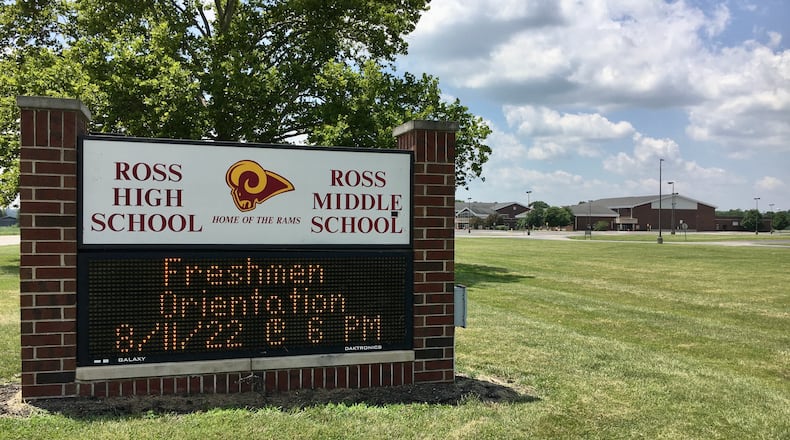And they said recently if the tax hike fails, it will re-appear in November’s election day and perhaps beyond until voters say “yes” at the polls.
Ross Schools are headed to the Aug. 2 ballot with a proposed property tax increase prompted by projected budget shortfalls and warnings from the Ohio Department of Education (ODE) about falling into the preliminary process of state control should the schools not return to solvency.
Residents in the 2,800-student, largely rural school system will be asked to decide on a 5-year, 7.99-mill, emergency property tax levy that if approved at the ballot would raise the annual school property taxes for the owner of a $100,000 home by $279.65.
Unlike most other Butler County area school tax campaigns, there are few if any pro levy or anti-levy yard signs dotting neighborhoods.
But discussions regarding the levy - pro and con - have been a frequent feature on social media, including in recent months on a Ross community Facebook page
The impact of a voter rejection of the proposed tax hike would be especially significant on Ross school families with children playing school sports.
According to the district’s website, a defeat of the levy would raise the individual school sport “base participation fee” to $825 per sport with no individual student or family fee cap per school year.
Voter approval of the new school tax would see individual sports fee per student charged at $150 per sport with an individual cap of $300 with a family fee cap of $450.
When asked to comment, Ross Superintendent Chad Konkle and Ross Board of Education President Sean Van Winkle, both pointed to a series of public statements posted on Ross’ district website for explaining the need for raising the school property tax.
The school board recently approved placing the same school levy issue on the November ballot should it lose at the polls on Aug. 2.
In the district’s May statement, they said if voters don’t approve the new tax, school officials will be forced to continue to place it on the ballot, which in Ohio is allowed four times each year.
Another school board statement noted: “The district has drastically cut costs during the last two years. Last year $600,000 was cut, and this year $700,000 was cut. Unfortunately, we are not able to cut our way back to financial stability because this is not a spending problem, but rather a revenue problem. The state of Ohio views Ross as a wealthy community. Because of that, they have diminished their contributions and expect residents to more aggressively fund their schools.”
Ross’ last property tax levy was passed in 1999, though in subsequent years the district, which includes a high school that has been consistently rated among the academically in the region, has relied on school income tax revenue to fund its operations.
“For the last 23 years, the district has provided students with a stellar education, comparable to districts such as Indian Hill, Wyoming, and Sycamore, only with much less revenue from our tax base. A small income tax levy was passed in 2019, but that was not substantial enough to bear the ongoing demands,” wrote board members.
Long-time Ross Twp. resident Dianna Evans said she supports the current tax ballot issue and said the district’s long track record of being one of the top academic performers among all southwest Ohio school systems have earned her vote.
“I love this school district and it’s great. Everybody I talk to also supports the schools and I think it will pass,” said Evans.
“Everybody I know wants to move here and take their kids to this district.”
Fellow Ross resident Karen Chen has lived in the district for more than two decades and her daughter graduated from the local schools.
“I hope it passes. Some of neighbors are mixed about it. Inflation is hitting at the same time as the levy and that is impacting some people,” said Chen.
But, she said, the levy “is good for the kids” and she plans to vote for it.
“And that’s the main thing. This is an excellent school district and it will help the kids.”
About the Author


